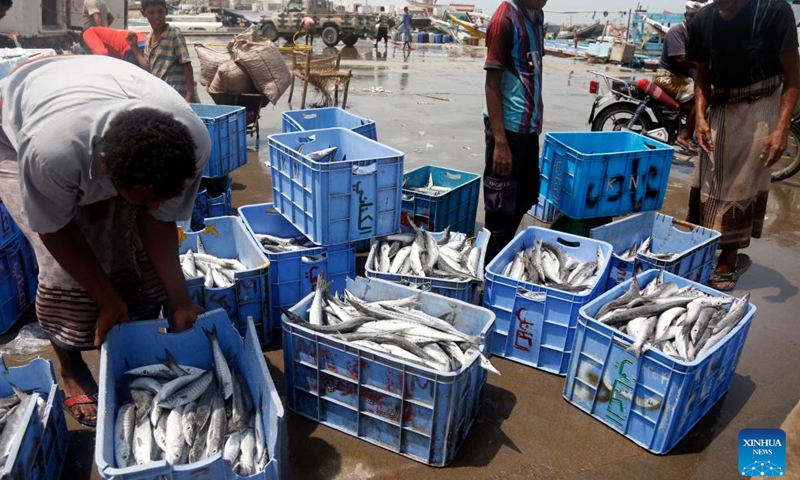
Fishermen carry freshly-caught fish to a market at a fish port in Hodeidah Province, western Yemen, on July 16, 2023.(Photo: Xinhua)

Fishermen return to a fish port in Hodeidah Province, western Yemen, on July 16, 2023.(Photo: Xinhua)

Fishermen transfer freshly-caught fish at a fish port in Hodeidah Province, western Yemen, on July 16, 2023.(Photo: Xinhua)

Fishermen unload freshly-caught fish at a fish port in Hodeidah Province, western Yemen, on July 16, 2023.(Photo: Xinhua)
In a fish port of Hodeidah Province, western Yemen, several small wooden boats return from their fishing expeditions.
The modest vessels are roughly five meters in length, slighter longer than a sedan. Most of them are beautifully painted in light blue and white, some even decorated with exquisite Arabesque on the prow.
There are small cabins on the ships to store freshly caught fish and ice cubes. But the fishermen, facing the relentless storms and scorching sunshine of the Red Sea, must endure the trip from the deck.
Fishing in Hodeidah has never been an easy venture, but the ongoing conflict and the economic crisis in Yemen have turned it into a mission impossible.
"I didn't catch much fish," Essa Al-Wesabi, a fisherman, said disappointedly while standing on the deck of his ship. "The only silver lining is that I've returned safely."
For Al-Wesabi and his fellow fishermen, each fishing trip is fraught with peril. This coastal province faces constant threats of airstrikes and naval mines, as it stands in the confrontational lines of the yearslong conflict between the internationally-recognized Yemeni government and the Houthi rebels.
"Every time I set out to fish, my wife sheds tears, fearing I might never return home just like many of my friends," he revealed, recounting his own near-death experience of losing three fishing boats to airstrikes that almost claimed his life.
"I am one of the fortunate ones. My friend, Al-Yateem, and his sons went out and lost their lives, all for some fish," Al-Wesabi said.
Fishing has been the lifeblood of the communities in the coastal province for centuries. Though the land may lack fertility, the sea bestows an abundant wealth of fish.
"Without fishing, many of us will starve. It is either sitting idle and starving or gambling our lives at sea," said the fishermen.
The Yemeni fishery sector has borne the brunt of the conflict, incurring substantial losses estimated at nearly 6.9 billion U.S. dollars, primarily because of the destruction of harbors, landing centers, and fishing boats, as reported by Yemen's Fisheries Authority.
Yemen's coastline, once a thriving expanse of more than 2,000 km brimming with fishing grounds, supported thousands of livelihoods and bolstered the national economy.
However, the civil war that broke out in 2014 has plunged the nation into a humanitarian crisis, with over 17 million people reliant on food aid and over 2 million children grappling with acute malnutrition.
Mohammad Husein, another fisherman, also shared his dire financial struggles caused by the war, noting the conflict not only makes fishing more challenging but dampens local demand, further reducing the fishermen's incomes.
"Fish markets throughout the country have witnessed a big downturn in prices, severely constraining our incomes," he revealed, adding fewer and fewer people can afford to buy fish, leading to a diminishing market.
The harbor, home to nearly 100 ships, often remains quiet for days or even weeks. Pelicans linger nearby, hopeful of scavenging any unwanted fish tossed overboard, as fishermen stare blankly at the Red Sea.
"The only way to regain our lives is to restore peace and order in Yemen. Then the fishermen can venture out to sea, and the farmers can cultivate their crops," said Husein.
